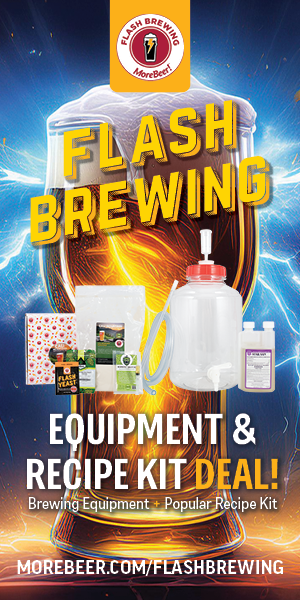Brewport Brewing Co.’s Dr. Foster’s Bridgeporter clone
Brewport Brewing Co.’s Dr. Foster’s Bridgeporter clone
(5 gallons/19 L, all-grain)
OG = 1.054 FG = 1.013
IBU = 37 SRM = 49 ABV = 5.3%
This recipe is Brewport Brewing Co.’s interpretation of a porter recipe from 1904 found in Hartmann Brewery’s recipe archives (the now defunct Hartmann Brewery was in the same city of Bridgeport, Connecticut as Brewport).
Ingredients
6.75 lbs. (3.1 kg) pale malt
2.75 lbs. (1.25 kg) flaked maize
1.5 lbs. (0.68 kg) Briess black malt (500 °L)
0.9 lb. (0.41 kg) Briess caramel malt (40 °L)
10 AAU Centennial hops (60 min.) (1 oz./28 g at 10% alpha acids)
5 g table salt
Wyeast 1099 (Whitbread Ale) or SafAle S-04 yeast
2⁄3 cup corn sugar (if priming)
Step by step
Mash the grains and flaked maize at 148–150 °F (64–66 °C) with 3.5 gallons (13 L) of water. After 60 minutes, run off and sparge with water at 160–170 °F (71–77 °C) to collect 6 gallons (23 L) of wort. Boil for 60 minutes, adding the Centennial hops and salt at the start. Cool to about 70 °F (21 °C) and pitch the yeast.
Ferment seven days at about 65 °F (18 °C), then rack to secondary for a further 5–7 days before racking to keg or bottling and carbonating to 2.0–2.5 psi. I recommend keeping this beer 3–4 weeks before drinking. It will be very bitter due to the large percent of black malt immediately, but a little age mellows that bitterness, resulting in an enjoyable historical porter.
Tips for success:
There is no water treatment in this recipe. That is because we used essentially the same Bridgeport water as in the original recipe from 1904 in which Hartmann made no adjustments. You should check the pH of your mash, which should be 5.4–5.5.
This will be somewhat darker than the original because of the lower
brewhouse efficiency (65%) and I have kept the malt ratios the same as in the original so there is a greater color contribution from the black malt. Feel free to adjust the malt bill weights to fit your brewhouse efficiency, keeping the grain ratios the same.
I have also not included a late hopping stage for simplicity since I do not think it added anything to the original. We did add Wye Challenger hops at flameout in the Brewport version, however.
Brewport Brewing Co.’s Dr. Foster’s Bridgeporter Clone
(5 gallons/19 L, extract with grains)
OG = 1.054 FG = 1.015
IBU = 37 SRM = 49 ABV = 5.1%
Ingredients
6 lbs. (2.7 kg) pale liquid malt extract
0.4 lb. (0.2 kg) pale dried malt extract
1.5 lbs. (0.68 kg) Briess black malt (500 °L)
0.9 lb. (0.41 kg) Briess caramel malt (40 °L)
10 AAU Centennial hops (60 min.) (1 oz./28 g at 10% alpha acids)
5 g table salt
Wyeast 1099 (Whitbread Ale) or SafAle S-04 yeast
2⁄3 cup corn sugar (if priming)
Step by step
Bring 3 gallons (11 L) of water to about 150 °F (66 °C), put the specialty grains in a muslin bag and steep them for 15–20 minutes. Remove the bag, allowing the liquid to drain thoroughly then stir in the extracts, making sure they are thoroughly dissolved before proceeding. Add hot water to bring the volume up to 5.5 gallons (21 L) and boil for 60 minutes, adding the hops and salt at the start. Cool to about 70 °F (21 °C) and pitch the yeast.
Ferment seven days at about 65 °F (18 °C), then rack to secondary for a further 5–7 days before racking to keg or bottling and carbonating to 2.0–2.5 psi. I recommend keeping this beer 3–4 weeks before drinking.
Note: I eliminated the flaked maize called for in the all-grain recipe so as to avoid the rather large partial mash that would be required. That meant this beer was somewhat more malty than the original, but that ensures
a good balance between the malt character and the bitterness from the black malt.






